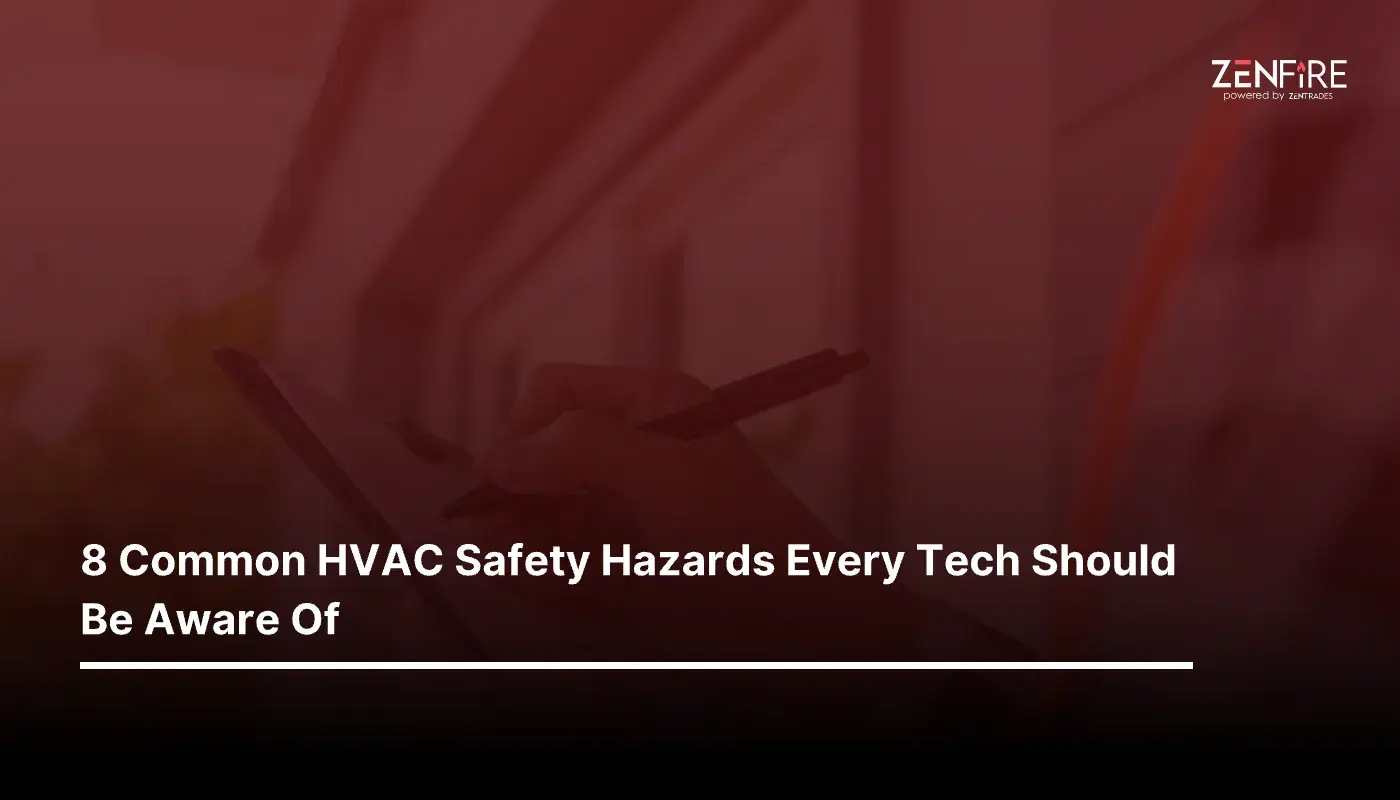8 Common HVAC Safety Hazards Every Tech Should Be Aware Of
- ZenHVAC
- 9 Min Read
An HVAC technician career offers excellent work stability, exciting challenges, and an average compensation that is above average. With this professional path, you’ll always have plenty of employment possibilities and room to grow.
Success in this field requires good training from knowledgeable leaders. While there are many advantages to being an HVAC technician, the task demands extreme caution and attention to detail.
But it’s considerably more complicated when you’re running an HVAC company. Along with all of these things, you also need to be mindful of the security of your professionals while they are working.
Because of this, it’s essential for your company that you are aware of HVAC safety guidelines and requirements.
On-the-job dangers and unsafe scenarios are frequently present for HVAC professionals. No matter how simple the work at hand may appear to be, safety must always come first. Technicians must be aware of the safety regulations and always remember them.
Eight of the most common HVAC safety hazards have been listed to assist you in learning and remembering the most crucial ones.
Every time one of your field technicians works on an assignment, go through them and try to abide by them.
We at ZenHVAC have created a vault of knowledge for HVAC contractors and technicians like yourself. Head to our website for more informative articles to enhance your business knowledge.
ZenHVAC’s field service management software can also streamline and optimize your workflow to generate growth and more revenue for your business!
Book a FREE demo today to start enhancing your business!
Here What We Cover
Electrical Hazards
Electrical wiring handling is a need for HVAC work. Before conducting routine examinations, testing, repairs, and other servicing procedures while on the job, technicians must de-energize all equipment.
Use these electrical HVAC safety tips to prevent mishaps:
In the breaker panel,
- Shut off electricity to the corresponding circuit.
- To prevent someone from trying to turn on the power while you are working, follow the proper lockout and tag procedures.
- Use an appropriately rated meter for the sort of circuit you’re evaluating to test the course to see if it is still electrified before beginning the task.

Use our free estimate template now
Make winning quotes in minutes—for any industry and any job.
Chemical Exposure
Exposure to hazardous chemicals and toxins is one of the industry’s most common HVAC mishaps.
Refrigerants, cleaning solutions, solvents, and gasses are just a few of the chemicals that technicians may encounter while performing their work. Even though the manufacturers rate many refrigerants as acceptable, heat exposure can cause the compounds’ toxicity to rising, lowering indoor air quality and putting technicians’ health at risk.
Before handling these chemicals, it is essential to receive proper HVAC safety training.
Exercise caution when handling hazardous materials and always wear dependable personal protective equipment (PPE), such as safety goggles, protective boots, and HVAC work gloves. Take every safety measure.
Respiratory Hazard
HVAC professionals are most frequently exposed to respiratory-related health concerns. The HVAC systems in many homes serve as breeding grounds for mildew, germs, and fungus, thanks to their dirty air filters.
Carbon monoxide poisoning can result from a furnace’s leaking heat exchangers and malfunctioning pilot lights.
Put on an industrial-grade face mask to avoid breathing in these lingering risks in close quarters and over an extended period.
A higher-grade cover, such as a cartridge-style or self-contained breathing mask, may be required when working in a contaminated and constrained location.
When working in these conditions, adequate airflow is crucial, and open spaces should be used whenever possible.
Falls and Slips
The risk of slips and falls is higher for HVAC technicians because they frequently work at heights or on elevated surfaces. Technicians should follow these safety procedures to avoid such mishaps:
Use the proper fall safety equipment, such as harnesses, lanyards, and guardrails, when working at heights, such as on rooftops or ladders. Ensure all fall protection equipment is in good working order and kept up to date.
Maintain an organized workspace: Maintain a tidy and organized environment, ensuring materials, tools, and equipment are all correctly stored to reduce trip risks. Use cable management solutions to secure and arrange electrical wires and hoses to avoid tripping or tangling.
Wear slip-resistant shoes: When walking in greasy or damp environments, it is essential to wear shoes with slip-resistant soles to improve traction. Wear indicators should be regularly checked on shoes, and replacements should be made as necessary.
Get posts like this in your inbox.
Keep learning how to run a 5-star business with our bi-weekly newsletter.
Fire Hazards
Fire risks are a significant worry regarding HVAC systems because they require working with electrical components, combustible materials, and heat sources.
Specialists should take the following precautions to avoid fire accidents: When working around open flames, such as pilot lights, exercise caution and keep flammable materials at a safe distance to prevent ignition. When necessary, use barriers or shields that are flame-resistant.
A rigorous no-smoking policy should be in place in any area where flammable materials are stored or used. Away from any potential fire concerns, designated smoking zones should be provided.
Equipment should be regularly inspected and maintained. HVAC equipment should be properly cleaned, oiled, and cared for to avoid overheating and potential fire threats.
Maintain the equipment per manufacturer recommendations, and plan routine inspections to catch problems early.
The health of the technicians and clients
HVAC workers frequently touch objects like door handles and thermostats as part of their work.
Before COVID-19, there were fewer health concerns connected to the transmission, but the pandemic forewarned us to take further precautions to ensure the health and safety of technicians and consumers.
And this is still a problem, especially for individuals who would be categorized as vulnerable. Simple safety measures can help reduce these persistent threats.
All transactions that can be conducted digitally (such as receipts and payments) should be handled in advance to limit interaction in circumstances where contracting COVID may still be a health issue.
All staff should wear a mask that is adequately suited for a visit. Additionally, technicians should keep a 6-foot distance and carry disinfectants for their hands and tools.
All workers should wash their hands after finishing the job, or at the very least, sterilize them until they can.
Naturally, any employee experiencing symptoms or having health issues shouldn’t be at work.
These precautionary measures ensure that the experts and clients are completely safe and ready.
Ergonomic Hazards
HVAC professionals frequently engage in physically taxing activities, such as carrying large objects, working in uncomfortable positions, or repeating motions. Technicians should put these safety precautions into practice to prevent ergonomic injuries:
Utilize the proper lifting techniques: When moving large objects, utilize the correct lifting techniques, such as bending the knees, keeping the back straight, and lifting using the leg muscles. Avoid twisting or jerking activities that could cause back injury or cause muscle tension.
Take frequent stops to rest and stretch your muscles. Simple stretching exercises can help lessen muscle tiredness and strain. To change up the tasks and lower the risk of repetitive motion injuries, consider introducing work rotation.
Extreme weather conditions
HVAC specialists frequently labor outside in sweltering heat or bitter cold. This puts them in danger of exhaustion, dehydration, heat stroke, hypothermia, and frostbite.
To prevent these problems as an HVAC technician, be aware of your limits, dress appropriately, stay hydrated, and take breaks as necessary.
Techs can only provide excellent customer service if they care for themselves and their coworkers. The well-being of a technician is time well spent.
Conclusion
While moving on to the next task may be your ultimate aim, hurrying might result in not only botched work that requires you to return later but can also place you and your ask at risk. Cutting corners can result in incidents that could put you in danger, expose you to toxins, and cause you harm. You’ll subsequently thank yourself if you spend a few extra minutes ensuring the job is done correctly and safely.
The ability to guarantee quality work in the shortest amount of time is frequently brought about by appropriate HVAC safety tips instruction, sufficient experience, and wisdom. To save time, some technicians often employ shortcuts. Shortcuts, meanwhile, might be risky when it comes to HVAC safety advice.
It’s critical to know when to stop working when you’ve been in uncomfortable, confined, or extreme temperatures for an extended time. Spend a brief period away from your work to relax or reenergize. Keep yourself in the most excellent physical shape possible to handle work by drinking enough water and eating regularly throughout the day.
How can you monitor your technicians to ensure they adhere to these workplace regulations? The simplest method uses a program like ZenHVAC for field service management.
The intelligent field management system includes several helpful features, including GPS monitoring, employee time tracking, dynamic team management, equipment tracking, and mobile apps for field service personnel.
These state-of-the-art solutions enable you to stay on top of your business wherever you are while ensuring total security and compliance.

Explore a better way to grow your business. Book a free demo now!
Get organized, win jobs, and wow customers.
Book A Free Demo with ZenTrades Today!
Related Reading
Why Your Field Software Management Software Needs QuickBooks Integration
ZenTrades Why Your Field Service Management Software Needs QuickBooks Integration Read More Request Demo...
Read MoreZenTrades How To Manage Electrical Service Agreements Like...
Read MoreZenTrades The Best 5 Jobber Alternatives In 2023...
Read More

